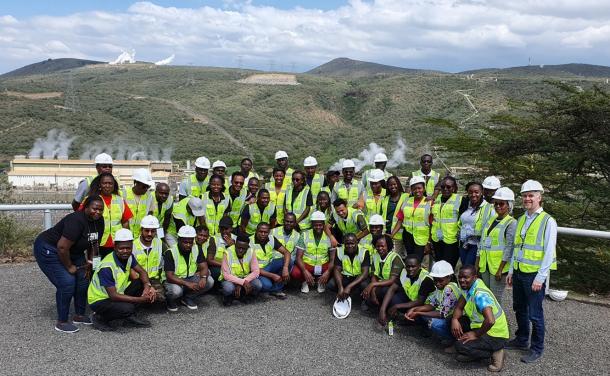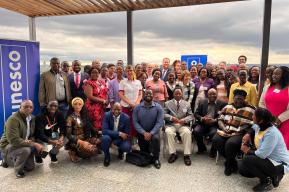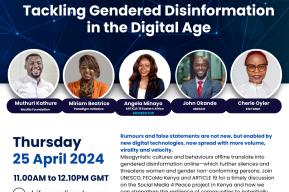News
UNESCO visits GRÓ Geothermal Training Programme (GTP) course for Africa

The GRÓ Geothermal Training Programme (GRÓ GTP) has over its four-and-a-half decades long history, placed great emphasis on supporting geothermal development in Africa, particularly in Eastern Africa as the Rift Valley holds significant potential for geothermal energy. Representatives from the UNESCO office in Nairobi visited the annual Short Course on geothermal exploration and development, that GRÓ GTP runs every year in cooperation with Kenyan energy companies.
GRÓ GTP is one of four training programmes that are run by the GRÓ Centre for Capacity Development, Sustainability and Societal Change in Iceland, that operates under the auspices of UNESCO. All four training programmes have a strong focus on Eastern Africa. The Geothermal Training Programme is the oldest of the four training programmes, established in 1979. The other three work in the fields of Fisheries, Gender Equality and Land Restoration.
From 1979 to 2023, 790 scientists and engineers from 67 countries have completed the annual Six-Month Training at GRÓ GTP. They have come from countries in Africa (39% - thereof 36% from countries represented by UNESCO Nairobi or 282), Asia (35%), Latin America (16%), Central and Eastern Europe (9%), and Oceania (1%). In total 152 Kenyans have participated in the training, 48 Ethiopians, 22 Tanzanians, 20 from Djibouti, 19 from Uganda, 12 from Rwanda, 7 from Eritrea and 2 from Comoros.

GRÓ’s support for geothermal development in Africa

The GRÓ Geothermal Training Programme has since its establishment focused on supporting geothermal development in Africa, due to the strong geothermal potential of the region, particularly in Eastern Africa as the Rift Valley. In addition to the 282 fellows who have been through the Six-Month training from countries represented by UNESCO Nairobi and 27 from other African countries, 50 Africans have graduated on a MSc scholarship and 5 Kenyans have also finished a PhD on a GRÓ scholarship. Currently there are two Tanzanians, one Djiboutian and one Congolese (DRC) studying on PhD scholarships from GRÓ.
Annually, GRÓ GTP holds a Short Course for the East African region on geothermal exploration and development in support of the SDGs, in cooperation with Kenya Electricity Generating Company (KenGen) and Geothermal Development Company (GDC). Since its inception in 2005, about 880 participants from 22 African countries have completed the Short Courses. The majority of the lecturers and organisers of these Courses are former GTP fellows who thereby have a venue for sharing their knowledge with colleagues in Kenya and East Africa.
SDG Short Course VII on Geothermal Exploration and Development was held in Kenya during November 14 – December 4, 2023. As the name implies, this was the seventh training in the series of Short Courses that are dedicated to supporting the UN Sustainable Development Goals. In particular, the aim is to support Goal 7 to ensure access to affordable, reliable, sustainable and modern energy for all by 2030, and Goal 13 to take urgent action to combat climate change and its impacts. In addition, the course is supportive of several other SDGs, including Goal 5 on gender equality.
The first week of the Short Course was devoted to fieldwork in the surroundings of Lake Bogoria in the Rift Valley. Then the course was moved to Lake Naivasha where the participants attended lectures on geoscientific exploration, environmental aspects of geothermal development, drilling, reservoir engineering, utilization, project management and financial considerations. The lectures were also complemented by field trips to the nearby Olkaria geothermal fields, laboratories, power plants and other destinations of interest to students of geothermal development. Three and a half days were committed to project work, where the participants were presented with data from both high and low temperature geothermal fields, with the objective of constructing simple conceptual models and siting wells.
The Course was attended by 42 participants from 13 countries: Comoros (2), Democratic Republic of the Congo (1), Djibouti (2), Eritrea (1), Ethiopia (2), Kenya (23), Malawi (1), Morocco (1), Nigeria (1), Rwanda (1), Tanzania (5), Uganda (1), and Zambia (1). The instructors came from Kenya, several neighboring countries in East Africa, and Iceland.
The course was the 18th event held in support to the UN development goals (MDGs and SDGs). The Workshop for Decision Makers on Geothermal Projects and their Management, held in 2005, was followed up by the Short Courses on Exploration for Geothermal Resources that were held annually over the period 2006-2015 in support of the Millennium Development Goals. The current SDG series was started in 2016.

In addition, a number of tailored courses and trainings have been held in Africa, which have been funded through external mechanisms. Information on these can be found on the GRÓ GTP website.
Emphasis has been placed on gender equality through the activities and operations of GRÓ GTP. After GRÓ GTP started to actively work on increasing the number of female fellows, more women have participated in the training. As the geothermal sector along with other STEM sectors, is a male dominated sector, it is often a challenge to reach gender equality in each cohort but encouraging and requesting women participation often raises awareness of gender equality among GTP’s partner institutes. Since the establishment of GTP in 1979, 199 women have graduated from the Six-Month Training, or 25% of the total. In last 5 years, this percentage has been 42%. Furthermore, 20 women have obtained a MSc degree (23%), and 2 a PhD (40%). GTP continues to support gender equality in all its activities and operations.

The GRÓ Centre was established as a UNESCO category 2 centre in 2020, bringing together four capacity strengthening programmes that have been a part of Iceland’s international development cooperation portfolio for decades, then as part of the United Nations University (UNU) network.
Some statistical information in graphics:

Since 2005, GTP has run various workshops, short courses and tailored trainings in Africa in cooperation with partners.









